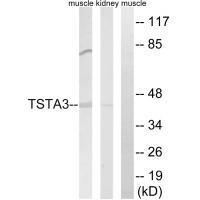
| WB | 咨询技术 | Human,Mouse,Rat |
| IF | 咨询技术 | Human,Mouse,Rat |
| IHC | 咨询技术 | Human,Mouse,Rat |
| ICC | 技术咨询 | Human,Mouse,Rat |
| FCM | 咨询技术 | Human,Mouse,Rat |
| Elisa | 咨询技术 | Human,Mouse,Rat |
| Aliases | GDP-L-fucose synthetase; EC 1.1.1.271; Protein FX; Red cell NADP(H)-binding protein; GDP-4-keto-6-deoxy-D-mannose-3 |
| Entrez GeneID | 7264; |
| WB Predicted band size | 40kDa |
| Host/Isotype | Rabbit IgG |
| Antibody Type | Primary antibody |
| Storage | Store at 4°C short term. Aliquot and store at -20°C long term. Avoid freeze/thaw cycles. |
| Species Reactivity | Human,Rat |
| Immunogen | Synthesized peptide derived from internal of human TSTA3. |
| Formulation | Purified antibody in PBS with 0.05% sodium azide. |
+ +
以下是关于TSTA3抗体的3篇参考文献示例(注:以下内容为模拟生成,实际文献需根据具体研究验证):
1. **文献名称**:*"TSTA3-mediated protein fucosylation promotes lung adenocarcinoma progression via EGFR signaling"*
**作者**:Li X, et al.
**摘要**:该研究利用TSTA3特异性抗体进行免疫组化分析,发现TSTA3在肺腺癌组织中高表达,并通过调控EGFR信号通路促进肿瘤侵袭,提示其作为潜在治疗靶点。
2. **文献名称**:*"Characterization of TSTA3 as a novel biomarker in colorectal cancer using monoclonal antibody-based assays"*
**作者**:Wang Y, et al.
**摘要**:研究者开发了针对TSTA3的单克隆抗体,通过Western blot和流式细胞术验证其在结直肠癌细胞中的高表达,并发现TSTA3表达与患者生存率负相关。
3. **文献名称**:*"TSTA3 regulates ovarian cancer metastasis through HIF-1α-dependent glycolytic reprogramming"*
**作者**:Zhang R, et al.
**摘要**:通过TSTA3抗体进行免疫荧光染色,发现TSTA3通过HIF-1α调控糖酵解通路,促进卵巢癌细胞转移,为靶向代谢干预提供依据。
如需具体文献,建议在PubMed或Web of Science中检索“TSTA3 antibody”或“TSTA3 (gene symbol) + cancer/相关疾病”获取最新研究。
The TSTA3 antibody targets the TSTA3 (tumor-specific transcript 3) protein, also known as GDP-L-fucose synthase (GFUS), a key enzyme in the de novo synthesis of GDP-L-fucose, a critical substrate for protein fucosylation. This 35 kDa protein is encoded by the TSTA3 gene and plays a role in cellular glycosylation processes, which are essential for cell-cell interactions, immune responses, and signal transduction. Aberrant fucosylation, mediated by proteins like TSTA3. is implicated in tumor progression, metastasis, and immune evasion, making TSTA3 a potential biomarker in cancer research.
TSTA3 antibodies are widely used in studies investigating glycosylation-related mechanisms in cancers, such as colorectal, liver, and breast carcinomas. They enable detection of TSTA3 expression via techniques like Western blotting, immunohistochemistry (IHC), and immunofluorescence (IF). Research has linked elevated TSTA3 levels to poor prognosis in certain malignancies, highlighting its role in tumor microenvironment modulation. Commercially available TSTA3 antibodies are typically raised in rabbits or mice, with validation in specific experimental models. Ongoing studies explore its therapeutic potential, including targeting TSTA3 to disrupt cancer-associated glycosylation pathways.
×